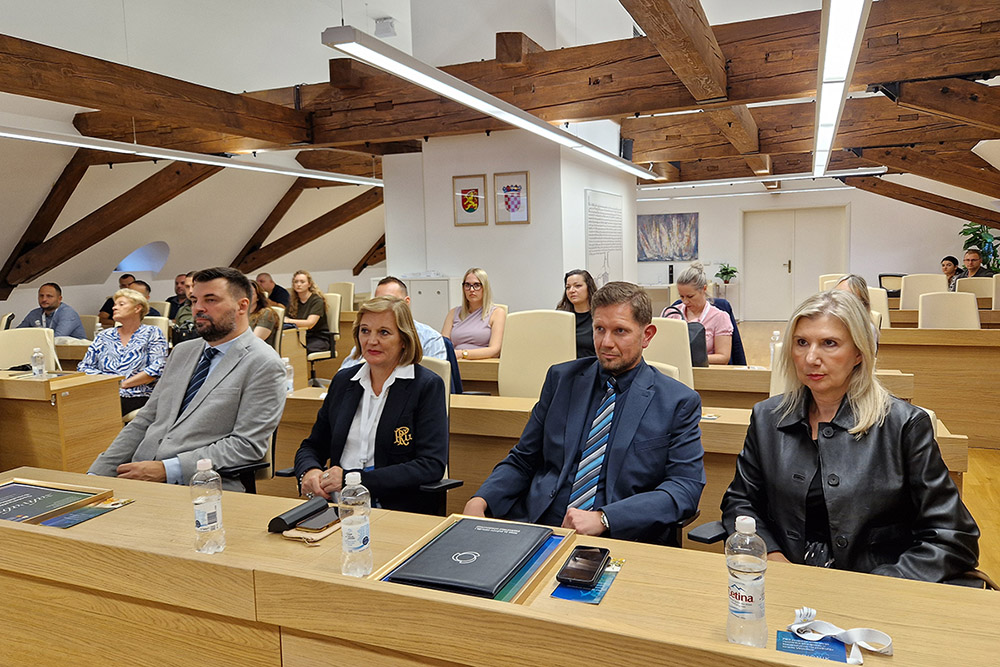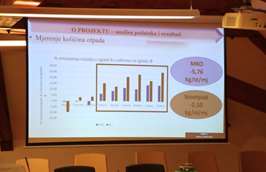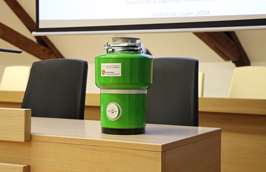09.09.2024.
Results of the pilot projects for the installation of kitchen waste disposal units aimed at reducing the share of biowaste in municipal solid waste were presented in Virovitica.Food waste accounts for a significant part of solid waste and today represents a serious challenge. In the area of Virovitica and neighbouring municipalities, more than 4,000 tonnes of food waste and other biodegradable waste are generated annually, with most of it being landfilled. Therefore, a pilot project was launched to reduce the generation of biowaste using kitchen waste disposal units.
Saša Pupovac from the Environmental Protection Sector at the Fund pointed out that in municipal solid waste biowaste accounted for as much as 37 percent. Of that, more than 30% is household waste, and the rest garden waste (5.68%), and skin and bones (0.45%).
“With the aim of proper biowaste handling, the Fund is co-financing the purchase of containers for the separate collection of biowaste and home composters through public calls for local self-government units and their utility companies. Also, the Fund is co-financing the purchase of biowaste/food waste prevention devices (digestors) in hotels, kindergartens, hospitals, retirement homes, and children’s homes,” added Pupovac.
This pilot project was co-financed by the Fund with a share of 40%, while the remaining funding for its implementation was provided from the Virovitica city budget. "Given today's way of life and the ubiquitous consumerism prevailing in society, we want to give our citizens guidelines on how to reduce the amount of waste and how to manage it responsibly. Waste disposal units are one of the better solutions to this problem", said mayor Kirin.
In addition, as part of this pilot project, kitchen waste disposal units for shredding food and other biowaste were installed in one building in Virovitica, while the other building was used as a baseline for comparing the results, which were, in the words of the manager of FLORA VTC Vlado Šušak, “beyond all expectations”.
For the last 6 months, residents of the trial building in Pejačevićeva Street were throwing fruit and vegetable peels, and scraps from other ingredients used to prepare meals into the garbage disposal units. The disposal unit was also used to shred eggshells, fish and poultry bones, smaller bones of other animals, coffee grounds, and pet food scraps. In smaller quantities, even larger bones, fruit pits, pasta and rice, onion and corn husks and banana peels were also shredded.
"Although the sample was small, every step forward in waste management, especially of biodegradable waste, is a great success. Starting with the reduction of waste transport costs, reduction of disposal costs and reduction of landfill gas emissions, this measure makes it easier for all disposal units users to deal with biodegradable waste. The costs are smaller, there are no bin bags, nor plodding to the brown bin time and again," Šušak explained.
Professor Aleksandra Anić Vučinić from the Environmental Engineering Studies at the Faculty of Geotechnical Engineering in Zagreb was one of the speakers at the conference, pointing out that the reduction in the amount of municipal solid waste and biowaste recorded in the pilot project was excellent.
If such kitchen waste disposal units were to be installed in at least 50 percent of households in the Virovitica area, the amount of municipal solid waste would be reduced by 70 kilograms per capita annually. With this pilot project, Virovitica has demonstrated that a small, local community can cleverly solve current problems and challenges, which are by far more prominent in larger cities.
At the final conference of the pilot project, other participants from the Fund, along Saša Pupovac, included advisor to the director Ljiljana Bukovec, head of the department at the EU Funds Sector Vesna Cetin Krnjević, and environmental projects manager Milovan Zrakić.













